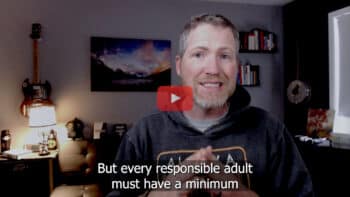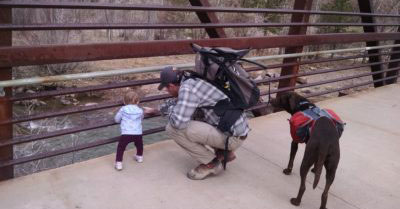Family matters no matter where you’re at on your resilient life journey. But family can make or break your efforts. They can make it easier or much more challenging.
So today, I want to talk specifically to those who are struggling.
- Maybe your family is acting like a roadblock to your preparedness efforts.
- Or perhaps you just got started living a more resilient life and want your loved ones on board.
- Or maybe you’ve been prepared for years, and your spouse is on the same page, but your kids think you’re both crazy.
- Your parents, aunts, or uncles might disapprove of your worldview.
No matter your scenario, we can all agree resistance, disapproval, and undermining by family members will slow down your progress.
Today I’m going to provide my best advice and suggestions to get your loved ones on board.
Accept, and perhaps even start helping you prepare for the unknowable future. To fully embrace the concept of living a resilient life.
To turn them from a roadblock to pitching in.
Before we proceed, I assume you care what your family thinks. This is an important assumption.
I know fellow resilient life coalition members whose family members are not on board – but the member couldn’t care less.
To me, this is not ideal and creates an unhealthy situation. But these members have decided they’re going to live a resilient life no matter what. If this sounds like you, then feel free to stop reading now; this article is not for you.
If you’re still reading, I’m going to assume you do care – that you’re willing to put the effort in to get your loved ones to support you and not work against you.
Spouses and Significant Others
I’m going to begin with, the most common family challenge I get asked about…Spouses.
I get emails from members who ask for advice on how to get their spouse to buy into the idea of preparedness and living a resilient life.
Many of these folks are new to this idea. And they’ve recently realized how fragile our way of life is and are motivated to take immediate action.
If this is you, I applaud you for this mindset shift.
Everyone who’s a part of the resilient life has had this eye-opening realization at some point. Maybe a destructive natural disaster swept through your neighborhood. Or the last economic collapse got a little too close for comfort. Or the Covid-19 pandemic shook your worldview…
After these life-altering moments, but before you’re fully prepared, you lose a lot of sleep at night.
But just because you’ve recently realized this doesn’t mean your spouse has. They may still be living with their head in the sand. And for many people (the fragile masses), that’s the way they’d prefer to live.
For the fragile masses, “ignorance is bliss.” They don’t want to see the truth; they don’t want to leave their fantasy land.
And they sure as hell don’t want to start getting prepared. Because they would admit that life is not as safe and permanent as they’ve been led to believe.
They will accept and admit to some harsh realities by taking action. And that’s the real reason why many people resist all forms of preparedness – even basic prepping.
So, what can you do if you believe this is your spouse’s mindset? How can you change this behavior?
First, don’t attack the problem head-on. You need to work on this situation from both sides and use logic. If you use emotional arguments, you won’t win. Emotion rarely works to convince – especially those determined NOT to be convinced.
So instead, start by taking advantage of our culture’s 24-hour news cycle.
Over a few weeks (or months), you can use plenty of tragic events as conversation starters.
Try getting your spouse to engage in a conversation about these events – such as natural disasters, public shootings, contaminated water, terrorist attacks, pandemics, etc.
These news stories are one way in – a foot in the door. The more someone realizes the news is not “somewhere else” happening to “someone else” but stories about people just like them, the more open they’ll be to taking action.
Small Steps In The Right Direction
This now leads to my second piece of advice – start small. I can’t stress this enough. You often realize just how under-prepared you are, and you decide it’s time to become self-reliant as quickly as possible.
But a fast pace may only frighten your skeptical spouse. As odd as it sounds, you may need to go slow to go fast.
Start with actions everyone must agree on. Start with purchases nobody can honestly refute – things like fire extinguishers, outdoor security lighting, deadbolts, and natural disaster emergency kits.
These actions are small steps that every responsible adult should have in place. No excuses!
Heck, for a few of these steps, you may be able to save a few dollars on your home insurance. For example, install deadbolts if you don’t have them yet. Heck, there’s even a fair chance you’ll get a slight premium reduction on your insurance.
If it works out, you also cut the “no money” counter-argument from your spouse.
Sure, you’ll spend a few dollars upfront to buy and install deadbolts, but you’ll save on your premium. The same idea goes for fire extinguishers.
Another excellent first step is to purchase a small hand-crank weather radio.
Knowledge is power, and a hand crank weather radio gives an advanced warning and intel. These devices save lives. So getting them on board with such a small but smart survival investment is a perfect first step.
Try to bring them into the decision process. Don’t do all the talking.
- Ask for their opinion and where they think you should install it.
- Ask them if you think you should invest in more than one.
- Do they want a large, clunky one or one that fits in their pocket?
Ask, and then shut up! Let your spouse talk, and you listen carefully to every single word.
You’re not seeking approval. You’re seeking buy-in – there’s a big difference.
How about picking up a large bag of rice or beans as extra food, in case you’re forced to hole up for a couple of days?
Please don’t make a big deal out of it. Yes, talk about it but don’t start discussing doomsday predictions. Make it about common sense.
Your goal is to get some basic preps in place without freaking out your loved ones.
The biggest key is to make your spouse a significant part of these first steps. Don’t make it about you or even about the family; make it about them. Put your ego aside, make them feel important, and make THEM your family’s hero. Also, seek common ground. Look for opportunities or hobbies your spouse already has an interest in.
For example, do they have a green thumb? Are they into gardening?
- Perfect, get them into heirloom seeds and seed saving.
- Start a compost.
- Start canning extra produce from the garden.
- Set up a rain harvesting system.
- What about hobbies such as raising free-range chickens in the backyard?
- Or rabbits?
- Or beekeeping?
- Or sewing?
- What if they are into fabrication?
- Welding?
- Carpentry?
- Hunting?
Any of these hobbies are great for living a more resilient life. They’ll likely be more interested in these hobbies than preps like ammo storage or making survival bread.
And getting prepared is not just bugging out and firearms. There are a lot of hobbies that are perfect for supporting a resilient mindset.
Most of these hobbies are taken up for fun and not for preparedness. So who cares if your spouse calls it a hobby vs. “becoming resilient“? As long as you’re moving in the right direction.
Foster interests your spouse already has to help move forward.
When they feel good about these first steps, they’ll be more open to the next set of preparedness actions.
However, don’t go from “baby steps” to stockpiling two years’ worth of food and six cords of firewood overnight.
Instead, try a simple step, such as getting a rocket stove for cooking food during a short-term power outage. That’s a better place to start.
Maybe, your ultimate goals are more extensive than these initial steps, but keep that to yourself for now. You can share those with your spouse later once you’ve taken several actions in the right direction after you’ve had some quick wins and gained momentum.
Once you have the first few baby steps in place, it’s time to start going a bit bigger.
Try getting your spouse on board with one month of emergency food.
Be prepared for some push-back, though. But that’s when you keep using the news stories to your advantage. It’s called authority jacking.
Authority Jacking Strategy
You’re using the authority of large news networks, such as Fox News, CNN, Blaze, etc., to help make your argument. They often discuss the world in a way that makes it evident that life can be dangerous.
Do you want to get your husband or wife into firearms and go to the practice range? Then highlight news stories of public shootings.
These events will support your ultimate goal of improved family defense. That is unless your spouse is someone who believes in gun confiscation. If that’s you – look for some non-lethal defense weapon alternatives.
Ideal? I don’t think so, but you got to play the hand you’re dealt.
Yet, if your spouse is just more concerned about firearm safety, make it a high priority to take all safety measures. Buy a gun safe, and trigger locks are a must from day one. It’s all about comfort and responsibility. And it’s about listening to them.
If they voice concern, no matter how small or how trivial, listen – don’t argue!
Suggest compromises that show you care – that their opinion matters.
Heck, plan to compromise intentionally. Sometimes you have to lose the battle to win the war.
You let down your spouse’s guard by listening and accepting their opinion. You’re building trust. You’re not two individuals bickering; you’re on the same team working together.
Again, once you get the ball rolling, it will help to gain momentum. The key is to be very careful early on.
They’ll dig in their heels if you come out of the gates and scare your spouse. Once that happens, your efforts will be more difficult for years to come.
I’ll leave you with one final word of advice for your spouse. Make it fun.
People don’t often associate fun and self-reliance together. It’s a serious journey, no doubt, but that doesn’t mean you shouldn’t celebrate success along the way.
If your spouse notices you’re happier after meeting your preparedness goals, they’ll want to see more of that.
For example, immediately after getting a few home security measures in place, take your spouse out to dinner. Or surprise them with a small gift once you’ve reached a 1-month food stockpile.
They’ll want to join in when meeting resilient life milestones is fun.
And that’s what The Resilient Life is all about – making preparedness and living a resilient life more obtainable and enjoyable.
Sons and Daughters
Maybe your kids (or even your grandkids) are the “problem.”
Now with young kids, you don’t need their permission to get prepared. If that’s your issue – I cannot help you.
My best advice with young kids is to get them involved early and often. The younger, the better. Start instilling the basic principles of hard work, self-reliance, planning, and adapting early and often.
Also, with little ones, ensure they understand this is a personal family matter. This secrecy is especially true with regard to your stockpiles.
But don’t make too big a deal out of your stocks to your kids. They will sense its importance and brag to all their friends if you do. Not good…
If you don’t make a big deal out of it, they won’t either. That’s what you want with the younger ones.
Now, if your kids are young adults or grown up and don’t approve, I call this a hassle. Now before I move on, notice I used the word “hassle.”
That’s because you’re the parent and don’t need their permission. Unlike a spouse, with who you’d prefer to be on the same page, it less essential with your adult children.
But, if they still live with you (or close by), imagine how amazing it would be if you could get them on board with your preps.
It would be fantastic.
When disaster strikes, you’ll want a small survival coalition anyway. A group that works together to increase your survival odds. But the issue with any alliance is always, who can you really trust?
If your adult children are on board, they’re blood, kin, and the ideal team you can (hopefully) trust.
So let’s assume you want to start a survival plan with them. But let’s say they have zero interest – or think you’re paranoid.
OK, you need to understand that they see the world from a different point in their lives. They likely haven’t lived long enough to know what real disaster or famine looks like. On average, young adults in their 20s or even early 30s on average don’t worry much about the future.
They are more focused on the short term, like themselves and their clothes, hair, etc.
They also don’t save their money and instead live in the moment.
Young folks think they have less to lose since they don’t have homes or kids yet. This is fine, but it can be challenging to get through to them. The good news is you have time on your side. As they move into their mid-thirties and early forties, they’ll tend to realize preparedness and resilience make sense.
They’ll have had a chance to buy a home, start having kids of their own and accumulate stuff. Only then do they begin to realize fate can take these blessings away from them overnight. So often, they come around to the idea of getting prepared as they get a few decades under their belts.
So take advantage of this trend. Use the same tactics we discussed earlier (news, baby steps, etc.) to work your influence on your kids.
Someday they may see the light and join your survival coalition with open arms.
What IF Your Parents Are the Issue?
This one comes up less often, but what if you want to convince your parents to prepare more? I’ll make this simple, they’re either on board or they’re not.
If you’re still living in their basement, you’re probably not reading this, and you’ve got other issues to work on first.
You don’t need their permission if you’re an independent adult. Sure it’s nice when Mom and Pop support you, but it’s not required. And if they refuse to prepare themselves, then that’s on them.
If they go out of their way to give you crap, stop giving them fuel. Start limiting your time with them until they get the point.
Again, use some of the “spouse” tactics we discussed earlier if you want. But, if you don’t live with them, I don’t recommend spending all your time and energy doing so.
The good news is most elderly parents already have a preparedness worldview.
Siblings Not On-Board?
The same strategies go for siblings as parents. They can make a much more powerful coalition if they live close and are on board. One you can trust.
But if they’re dead set against it, don’t go nuts attempting to change them overnight. Instead, work at convincing them little by little over time, but don’t kill yourself over it either.
Honestly, I’d rather invite a dedicated friend into my survival coalition over a sibling that wants nothing to do with living a resilient life.
Does Your Extended Family Matter?
Not really. Same story here. You’ve got a significant opportunity if they are onboard with minimal effort. However, if they are dead set against it, move on.
Focus On Those Who Matter Most
So, the key is to focus on those that matter most.
Sure, you could get your entire family and extended family 100% on board in a perfect world. Helping take action and sharing resources to become completely self-reliant.
And if that’s something you believe you can pull off, great. Full steam ahead.
But the key is to get those who live with you on the same page. Otherwise, your preparedness journey may end before it even starts.
And that would be a real shame.
“Just In Case” Jack
P.s. One of the best ways I know how to convince skeptical family members is by joining The Resilient Life.
It’s an online coalition of like-minded folks who are working to increase their self-reliance.
Fun survival challenges and preparedness badge requirements help motivate and improve self-reliance. It also tracks your progress through something called the “Readiness Score.”
Click here right now to learn more.

"Just in Case" Jack
Co-Founder of TheResilientLife.com and SkilledSurvival.com. Creates content, helps members, and is the visionary behind The Resilient Life’s way of living. Husband, father, mechanical engineer, survivalist, and prepper.
See how to find purpose & fulfilment through living a resilient life.




